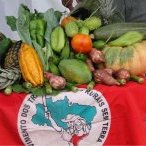
26 February 2014 | Interviews | VI Congreso MST-Brasil | Food Sovereignty
The different ingredients in Popular Agrarian Reform
Son of small landless farmers, he joined the Landless Movement (MST) in a land occupation action in 1984, a year after the movement was created. Today, he is a member of the MST National Board. In an interview with Real World Radio conducted by Viviana Rojas (member of La Via Campesina International´s communication team), Gilmar Mauro shared a socio-political analysis of the history and the social, economic and political role of the MST.
In the interview carried out in the framework of the 6th MST Congress (February 10-14), the leader said that the Congress was “an important capacity-building, struggle and articulation space, because it is very difficult for all of us to meet due to economic or geographical reasons”.
The fact that this year is the MST´s 30th anniversary is considered an achievement by Gilmar: “The MST is the longest standing peasant organization, others were destroyed, mainly by the 1964 military dictatorship”. This is a moment of assessment to analyze how to move forward: “We are rescuing the history of peasant movements and we also have our history, and based on it, we are assessing our progress and mistakes, and the political challenges ahead of us”.
On the achievements of the movement, Gilmar highlighted: “I believe our most important achievement is rescuing the dignity of our people”. This dignity is about, among other things, the struggle for peasants to turn into political subjects. “We were able to build a social organization maintaining a political path. This has provided us with the conditions to fight for land, for credits, for housing, together with a capacity building process and a political struggle”.
To carry out the economic struggle separately from the political struggle, according to the leader, is a “pro-bourgeoisie” separation: “first, because it prevents the people in the economic struggle from accessing a certain degree of awareness and turns them into political subjects. Secondly, a political party disassociated from the real matters of the people becomes a bureaucracy”.
When making reference to the different components of the MST´s building of popular agrarian reform, Gilmar Mauro used a metaphor with the typical Brazilian dish “feijoada”: “The main ingredient in feijoada are beans, and then different seasonings and pork meat are added. You can´t make feijoada without beans, but a feijoada with nothing else than beans, doesn´t have much flavor. The same happens with agrarian reform. You can´t have agrarian reform by only distributing land. Land is the main ingredient, but there needs to be capacity-building, cooperation, agroindustries, schools and attempts to eradicate illiteracy, investing in political training, in communication, etc”.
All these elements have been strongly promoted by the MST throughout all these years and the movement´s organization process has allowed to achieve significant victories in all areas mentioned above, said the leader.
Imagen: mstsergipe.blogspot.com







